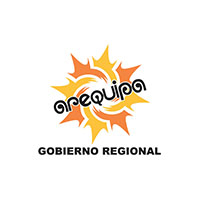Hay Festival Arequipa 2023
Hay Festival Arequipa 2023 was held November 9-12, with 109 activities with 145 guests from 15 countries. We will offer 17 talks and workshops for students at the Hay Joven programme and 7 events for children at Hay Festivalito.
Hay Forum Moquegua took place on 8 November with four activities on education and current affairs.
Events are available at Hay Festival Anytime.
Event 19
Natalia Sobrevilla and Alberto Vergara in conversation with María Luisa del Río
Peru explained
Centro Cultural Peruano Norteamericano (auditorio)
Read moreExplaining the past helps us to understand the present, and even more so when dealing with a country as complex as Peru. Natalia Sobrevilla and Alberto Vergara will be the ones to undertake this challenge, in a conversation that will begin with their recent publications. Perú global, co-edited by Vergara and Adrián Lerner, is the first volume in a series to cover the issue of Peru in the world. Around 20 researchers analyse key moments from the country’s past, set in a global context. Sobrevilla has written about the life of Ramón Castilla in Los años de Castilla (1840-1865), telling us about the figure who was president of the republic on two occasions. In conversation with María Luisa del Río.

Event 20
Pedro Baños in conversation with Hernando Torres-Fernández
Geopolitics: a Hispano-American viewpoint
Colegio de Arquitectos (auditorio)
Read morePedro Baños (Spain), a retired army colonel and geopolitical analyst, is a highly influential thinker about strategy and international relations in the Spanish-speaking world. In his latest book, Geohispanidad, he considers a geopolitical strategy to unite the Spanish-speaking countries and reinforce their global influence. He will talk to the diplomat and expert in international relations, Hernando Torres-Fernández, about the new alliances that are coming together, and the geopolitical board taking shape today.
Sponsored by Credicorp
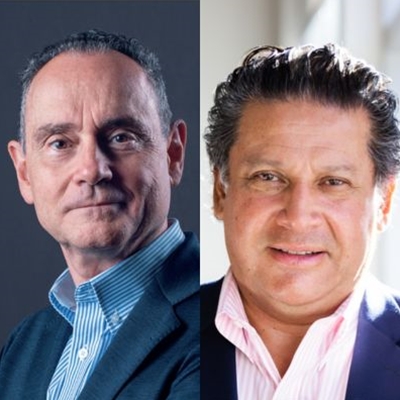
Event 20B
A City in a City
Documentary screening
Centro Cultural Peruano Norteamericano
Read moreThe Hay Festival Arequipa presents A City In A City (1971), a documentary directed by Roberto Savio about the Saint Catalina Convent, written and narrated by Mario Vargas Llosa. This cinematic masterpiece, awarded at the Cannes film festival in 1971, captures a unique historical moment: the first opening of the cloisters to the public. Roberto Savio, recognised Italian journalist and commentator, will offer an exclusive and once-in-a-life-time testimony on his creative process and his collaboration with the Peruvian Nobel prize winner, bringing back a valuable document of our cultural memory. Presented by José Carlos Mariátegui.

Event CL1
Reading club with Alejandra Moffat and Omar Zevallos
Mambo
Instituto Cultural Peruano Alemán
Read moreSponsored by SURA

Event 22
Héctor Abad Faciolince in conversation with Jeremías Gamboa
Sensitivity in the face of barbarism
Teatro Municipal
Read moreHéctor Abad Faciolince (Colombia) has been captivating readers for almost 20 years with the book Oblivion, the moving homage to his murdered father. Now his writings bring to us an even more personal event, the 2023 missile attack on a pizzeria in Kramatorsk, in the Donetsk region of the Ukraine. Abad Faciolince was unharmed, but Victoria Amelina (Ucrania), his travel companion and guide, died in the Russian attack. Ahora y en la hora is his report of the events, and a meditation on life, aging, death, war, violence and guilt. In conversatio with Jeremías Gamboa.
LSP Peruvian Sign Language interpretation available
Sponsored by the BBVA Foundation

Event 23
Eduardo Dargent and Susan Neiman in conversation with Pablo Quintanilla
Caviar, woke, left?
Centro Cultural Peruano Norteamericano (teatro)
Read moreCaviar and latte liberals, woke, lefties… all pejorative terms linked to a left wing, and all becoming more and more common. But, what is the woke left? Who are the latte drinkers? In Left Is Not Woke, Susan Neiman (United States) argues that the true progressive spirit —universalism, justice, reason— has broken up into identitarian posturing that is resulting in a new woke conservatism. The political commentator Eduardo Dargent (Peru) analyses the Peruvian version of the phenomenon in Caviar. Del pituco de izquierda al multiverso progre; as an insult, a label or a smokescreen, “caviar” is one of the most effective and persistent threads in the national political discourse. A conversation about works that (de)construct the left, with Pablo Quintanilla.
Simultaneous interpretation from English to Spanish available
With the support of Instituto Cultural Peruano Alemán
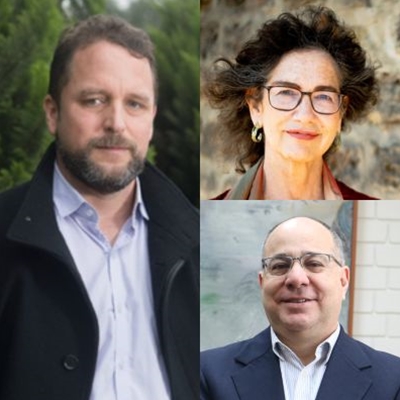
Event 24
Alonso Ruiz Rosas in conversation with Ignacio Medina
Arequipa taste
Centro Cultural Peruano Norteamericano (auditorio)
Read moreSponsored by Cerro Verde

Event 25
Pilar Quintana in conversation with Clara Elvira Ospina
Black Night
Colegio de Arquitectos (auditorio)
Read moreIn Noche negra, Pilar Quintana (Colombia) returns to the untamed and exuberant Colombian Pacific that she portrayed so convincingly in the acclaimed novel La perra. In her latest book, the protagonist finds herself alone for four days in a setting that is both terrifying and fascinating. She feels threatened not only by nature, but by the people around her. As well as her work as a writer, Quintana has recently edited the second issue of the Biblioteca de Escritoras Colombianas. In conversation with Clara Elvira Ospina.

Event 27
Claire Bishop in conversation with Heiner Valdivia and Fernando Zvietcovich
What does it mean to look?
Alianza Francesa de Arequipa
Read moreIn Artificial Hells, Claire Bishop (United Kingdom) followed the trail of artistic practices that discomfort, interrupt and reconfigure what we understand by seeing. Now, in Disordered Attention, in the context of an economy characterised by programmed distraction, she once again asks what it means to look. Her analysis dismantles the idea of pure contemplation and highlights the power of performance, dance and political interventions to mould a new type of perception: emotional, hybrid and shared. In conversation with Fernando Zvietcovich and Heiner Valdivia.
Simultaneous interpretation from English to Spanish available
With the support of the British Council
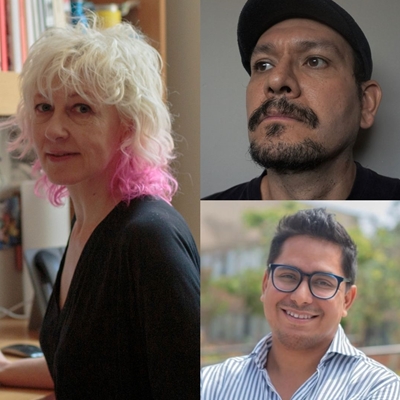
Event 39
Patricia del Río, Gustavo Rodríguez, Natalia Sobrevilla and Dante Trujillo
Five years of Jugo
Teatro Arequepay
Read moreFive years, five topics, five jugos. Jugo (formerly Jugo de Caigua) is five years old, and the jugueros Patricia del Río, Gustavo Rodríguez, Natalia Sobrevilla and Dante Trujillo will celebrate it at the Hay Festival Arequipa. The authors reflect on five of the most important matters of the last half decade. Liquid for us all to reflect on.

Event HFC4
La Carpa Librera
Plaza San Francisco
Read moreThe Carpa Librera is a space for reading and listening, where the reading mediators Estefani Bengoa and Sandra Linares Reategui will read children’s books. In a place designed for both young and old —including those who cannot read—, they can enjoy the stories hidden in books, and so perhaps the reading bug will bite them. The Carpa Librera will also have a small mobile library for children, young readers and adults.
Hay Festival Comunitario is sponsored by LXG
Event HFC5
Workshop with Anaisa Cornejo
Object books
Plaza San Francisco
Read moreWhat is a book? Starting with this question, the participants in this workshop, given by Anaisa Cornejo, will create new items based on the object-books they have at hand. At first, the pages will be completely blank, but will be given stories by means of collage, and so leave behind their status as objects and become books.
Hay Festival Comunitario is sponsored by LXG

Event HFC6
Book club: 'The Bitch'
Lead by Ainaí Morales, María Gracia Ríos and Rosario Yori
Instituto Cultural Peruano Alemán (Aula 5)
Read moreHay Festival Comunitario is sponsored by LXG

Event HFC7
Baila reading
Followed by dacing activities
Plaza San Francisco
Read moreHay Festival Comunitario is sponsored by LXG

Event 28
Rodrigo Quian Quiroga in conversation with María Fernández Flecha
Understanding the brain
Teatro Municipal
Read moreRodrigo Quian Quiroga (Argentina) is the discoverer of “concept neurones”, sometimes known as “Grandmother cells”, which activate the recognition of specific concepts, people or images. The neuroscientist explores the human brain in Cosas que nunca creeríais. De la ciencia ficción a la neurociencia, and tells us how the human brain turns scientific advances that once seemed impossible into reality. In conversation with María Fernández Flecha.
LSP Peruvian Sign Language interpretation available
With the support of PUCP

Event 30
Juan Gabriel Vásquez in conversation with Patricia del Río
Feliza Bursztyn: a woman ahead of her time
Centro Cultural Peruano Norteamericano (auditorio)
Read moreJuan Gabriel Vásquez is one of the most celebrated and interesting authors of contemporary Colombian literature. At this event, he will talk about his most recent book, Los nombres de Feliza, a recreation of the life of the sculptor Feliza Bursztyn, an artist who broke the rules imposed on women by her times. This is a rigorous novel that weaves together art, history and biography. In conversation with Patricia del Río.

Event 31
Laura G. de Rivera in conversation with María del Milagro Lozada
What the algorithm hides
Colegio de Arquitectos (auditorio)
Read moreWe are puppets of the algorithm, although sometimes we don’t realise it. The puppet master is not always artificial intelligence itself, but rather those who pull the strings to predict and mould our behaviour. The science journalist Laura G. de Rivera (Spain) has spent years researching the consequences of this invisible control. In Esclavos del algoritmo she offers a necessary and critical view of the impact of algorithmic systems on our lives. In conversation with María del Milagro Lozada
With the support of Acción Cultural Española, AC/E

Event 32
María Luisa del Río and Olga Montero Rose in conversation with Clara Elvira Ospina
In private
Teatro Arequepay
Read more
Event 33
Mathilde Forget in conversation with Verónica Ramírez
Of one’s own will
Alianza Francesa de Arequipa
Read moreMathilde Forget (France) has been inspired by the events of her own life to write her second novel, De mon plein gré, a short, sharp book about a woman who ends up doubting her own version of the facts. A portrait of a legal system and administrative violence that blames and shames those who seek help, and where the ambiguities of the language used can create a battlefield. In conversation with Verónica Ramírez.
Simultaneous interpretation from French to Spanish available
With the support of the French Embassy in Peru

Event HFC8
Workshop with Rodrigo Laguna
Create your own game
Biblioteca Regional Mario Vargas Llosa, Auditorio 2 (2do piso)
Read morePlaying with games that already exist is fun, but it isn’t every day that we can experience designing our own, with the excitement of seeing how ideas take shape and sharing them with others. Participants at this workshop with Rodrigo Laguna will design and build a boardgame inspired by an idea that motivates them. An activity that awakens creativity and encourages working together.
Hay Festival Comunitario is sponsored by LXG

Event HFJ10
Iñigo Maneiro in conversation with Andrea Chanove
Amazon: birds and inhabitants
Universidad Católica de Santa María — Instituto Confucio
Read more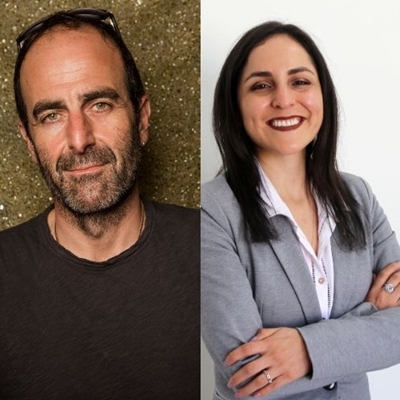
Event HFC8B
Juegos, cuentos y experimentos
Exploradores de la energia
Plaza San Francisco
Read moreEl Hay Festival Comunitario está patrocinado por LXG. Con el apoyo de SEAL
Event 26
Carlos Caamaño, Alejandro Castellote and Dante Trujillo in conversation with Gabriel Ruiz Ortega
Celebrating Mario Vargas Llosa
Centro Cultural Peruano Norteamericano (auditorio)
Read moreThis year the festival is offering a number of activities in homage to the life and work of Mario Vargas Llosa, including an exhibition by Morgana Vargas Llosa, dedicated to her father, and the publication of a book together with the Fondo de Cultura Económica which compiles the conversations of the Nobel laureate which have taken place at Hay festivals over the years. We meet the exhibition curators, Alejandro Castellote and Carlos Caamaño, and the book’s editor, Dante Trujillo.
Sponsored by Fundación BBVA and with the support of the Spanish Embassy in Perú and AECID

Event 34
Laura G. de Rivera and Rodrigo Quian Quiroga in conversation with Layla Hirsh
Talking about artificial intelligence
Teatro Municipal
Read moreArtificial intelligence has come into our vocabularies and our lives, and is here to stay. Yet when we talk about it, what exactly are we talking about? AI goes beyond algorithms, robotics and promises of utopian and/or dystopian futures. Laura G. de Rivera (Spain), author of Esclavos del algoritmo, and Rodrigo Quian Quiroga (Argentina), neuroscientist and the discover of “concept neurones” talk to Layla Hirsh.
LSP Peruvian Sign Language interpretation available
Sponsored by SURA and with the support of AC/E Acción Cultural Española
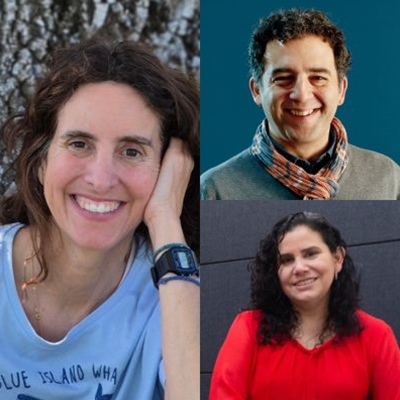
Event 35
Alberto Fuguet and Dany Salvatierra in conversation with Giancarlo Cappello
B movies and literature
Centro Cultural Peruano Norteamericano (teatro)
Read moreB movies have always been a type of refuge of all kinds of anti-hero. These stories have been low in budget, but high in imagination, and have often been transgressive and have featured those who live on the margins of society, those who are ignored. They have also been an inexhaustible source of inspiration in literature, as Alberto Fuguet (Chile) and Dany Salvatierra (Peru) will tell us, in conversation with Giancarlo Cappello.
With the support of the Chilean Embassy in Peru and the University of Lima
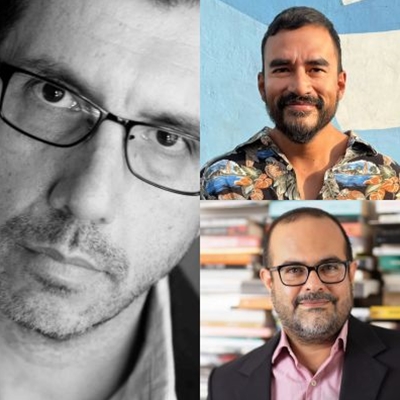
Event 36
Sonia Cunliffe, Enrique Planas and Zoila Vega Salvatierra with Jorge Malpartida
A salve against forgetting
Casa Tristán del Pozo - Fundación BBVA
Read moreWith its love of memory, literature can be a good remedy against forgetting. Zoila Vega Salvatierra reconstructs the history of Arequipa through the voice of six forgotten pianos in Cantan al hablar. Sonia Cunliffe traces a history of migrations, losses and grief in El tropiezo del sol, which tells the story of two women whose lives are brought together by two separate earthquakes. In El álbum de las cosas olvidadas, Enrique Planas explores the emotional links we have with the objects that time has left behind, and examines our own obsolescence. In convrsation with Jorge Malpartida.
LSP Peruvian Sign Language interpretation available
Sponsored by Cerro Verde

Event 37
Pascal Riviale in conversation with Mario Rommel Arce Espinosa
French ethnology in Peru
Colegio de Arquitectos (auditorio)
Read moreThe remains of the civilisations of ancient Peru were a great attraction for the French adventurers, dealers and explorers who crossed the Atlantic in search of its mysteries. Pascal Riviale recreates the history of these ethnological journeys in Los viajeros franceses en busca del Perú antiguo (1821-1914). A unique view of French archaeology in the late 19th and early 20th centuries in Peru. In converation with Mario Rommel Arce Espinosa.
With the support of the French Embassy in Peru
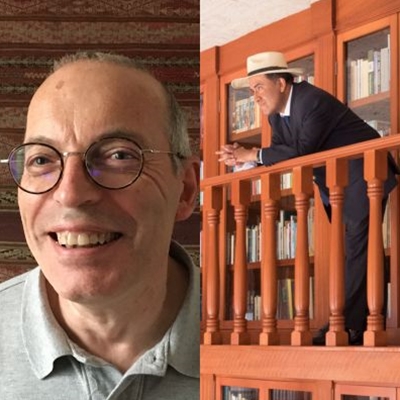
Event 38
Iñigo Maneiro in conversation with Nelly Luna
Learning to listen to the birds singing and the earth crying
Teatro Arequepay
Read moreListening to the Amazon to learn, and flying over it to make it heard. Both Nelly Luna and Iñigo Maneiro know the Amazon region well, and bring to us stories that illustrate the problems of natural resource extraction and not paying due attention to its inhabitants. In his article Sobrevuelo en la Amazonía: el rastro de los depredadores, Luna talks about how illegal mining has made part of the region into a tree cemetery. Maneiro has lived with the Awajún people and has learned about their relationship with birds, and has given us a view of their ancestral worldview in her book Saber escuchar el canto. Relaciones entre aves y humanos en el pueblo awajún.
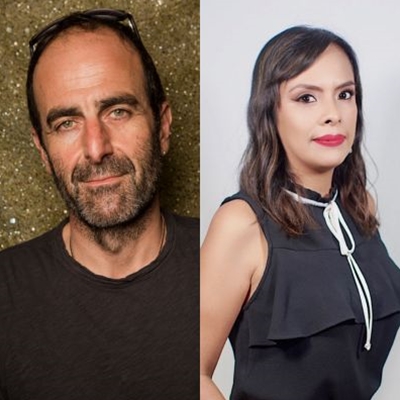
Event 40
Salma El Moumni and Diego Molina in conversation with Rosario Yori
First novels
Alianza Francesa de Arequipa
Read moreSalma El Moumni (Morocco) and Diego Molina (Peru) present their debut novels: Adieu Tanger and La fascinación, respectively. The first, winner of a France Culture award for a student novel, and shortlisted for the Prix Médicis, is a story about the destructive power the male gaze can have over women. After publishing three poetry books —Homesick, No somos más sabios después del diluvio and Expreso transeuropeo—, the Arequipa lawyer and poet has written a novel, and has indicated that he will soon move into the territory of the short story. In conversation with Rosario Yori.
Simultaneous interpretation from French to Spanish available
With the support of the French Embassy in Peru

Event HFC9
Workshop on Afro-Peruvian zapateo with Karen Jara and Juan Felipe Miranda
Omelenkó
Plaza San Francisco
Read moreCelebrating the centenary of the birth of Nicómedes Santa Cruz, the renowned Afro-Peruvian poet, ethnomusicologist and intellectual, we celebrate the culture with a lesson in Afro-Peruvian zapateo with Karen Jara and Juan Felipe Miranda, known as Juno Miranda. The perfect and most enjoyable way to learn Afro zapateo.
Hay Festival Comunitario is sponsored by LXG

Event HFC10
Poetry writing workshop with José Aburto
The poetic code
Biblioteca Personal de Mario Vargas Llosa, Auditorio Amelia Diaz
Read moreExperimental poetry —especially electronic poetry— offers this author the chance to break free from the linearity of the book. José Aburto will offer non-linear techniques of poetry writing to workshop participants, so they can use them in different formats, which will also be looked at here. In this way, they will practice basic writing resources that can generate poetic expressions in dispersed media.
Hay Festival Comunitario is sponsored by LXG

Event HFC11
Workshop with Ainaí Morales and María Gracia Ríos
Fanzines
Plaza San Francisco
Read moreA fanzine is a homemade publication, one that usually combines different formats and resources (collage, photography, illustration and/or text) along with varied subject matter. Those attending this workshop will be able to explore the memories, interests and emotions that bind their families. A unique opportunity to reflect on family identity, as well as experiences both long past and recent. The workshop will be aimed at Hispanic Literature students of the PUCP, accompanied by two of the course lecturers, Ainaí Morales and María Gracia Ríos.
Hay Festival Comunitario is sponsored by LXG
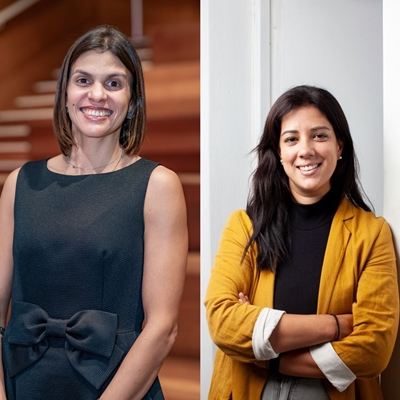
Event 41
Darío Sztajnszrajber in conversation with Ana Pais
Love and philosophy
Teatro Municipal
Read moreDarío Sztajnszrajber (Argentina) has brought philosophy to thousands of people, filling venues and appearing on television and radio. He has captivated non-specialist audiences by dealing with the big philosophical questions of history and contemporary ideas. In the eight theses of El amor es imposible, he dismantles the myth of normative romantic love. The philosopher questions ideas such as the perfect partner and invites us to rethink the notion of falling out of love as part of the desire for the impossible. In conversation with the BBC Mundo journalist Ana País.
LSP Peruvian Sign Language interpretation available
Sponsored by Fundación BBVA
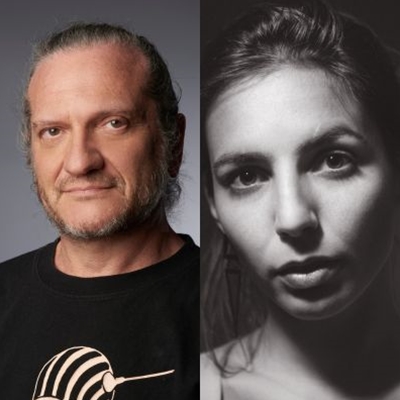
Event 42
Laura G. de Rivera, Susan Neiman and Boima Tucker in conversation with Eduardo Dargent
Challenges: who is in charge here?
Centro Cultural Peruano Norteamericano (teatro)
Read moreHidden hands pull the strings of the algorithms that make us slaves; a genocide in Gaza that the world watches without blinking; left-wing movements that are lost in tribal conflicts; and the diversity and complexity of the African continent. With the first quarter of our century past, we live in a time of challenges, when it is not always clear who holds the power. Laura G. de Rivera, Susan Neiman and Boima Tucker will put these topics, and other challenges, on the table in conversation with Eduardo Dargent.
With the support of Acción Cultural Española, AC/E and Instituto Cultural Peruano Alemán

Event 43
Carlos Granés in conversation with Patricia del Río
From 'Salvajes' to 'rugido'
Centro Cultural Peruano Norteamericano (auditorio)
Read moreWith El rugido de nuestro tiempo, the Colombian essayist Carlos Granés continues his task of dissecting the present that he began in Salvajes de una nueva época. We live in a time of ideological and geopolitical disorder in which there are both decolonial debates and pan-Hispanic nostalgia; a time of messianic politicians and artists who sacrifice transgression to yield to the latest moral demands. To understand the noise of our times, there is nothing better than listening to Granés. In conversation with Patricia del Río.
Sponsored by Grupo Gloria

Event 44
Elise Ann Allen, Pablo Quintanilla and Paola Ugaz in conversation with Camila Osorio
South to North Conversations: Catholicism in the 21st century
Colegio de Arquitectos (auditorio)
Read moreThe election of a pope with Peruvian nationality, his role in the changes that are hoped for in the Church, Catholicism’s challenges in terms of maintaining and attracting the faithful in an ever more secular era, what still needs to be done in the dissolution of the Sodalitium… With a quarter of the century passed, it is a good time to ask about the place of religion and Catholicism in the 21st century. Talking about this will be Elise Ann Allen, a journalist who specialises in Catholic affairs, and author of the biography León XIV; Pablo Quintanilla, an essayist and philosopher who has recently published Autoconocimiento y libertad; and Paola Ugaz, one of the journalists who uncovered the systematic abuses of the Sodalitium, and who worked on the book Mitad monjes, mitad soldados; they will be in conversation with the El País journalist Camila Osorio.
With the support of Open Society Foundations

Partner for Latin America

Principal Sponsor in Perú

Partner in Perú

Hay Festival Community

Government Partner
